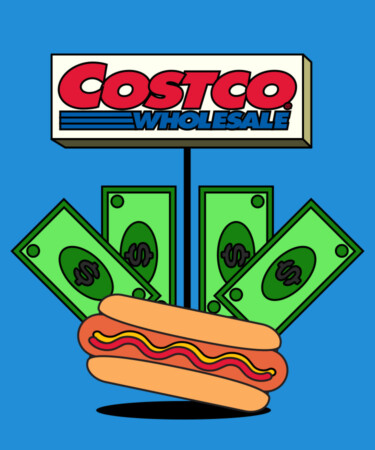This article is part of our Cocktail Chatter series, where we dive into the wild, weird, and wondrous corners of history to share over a cocktail and impress your friends.
Costco is beloved nationwide for its low prices on everything from bulk paper towels and toilet paper to snacks and alcohol. And with all the walking that happens while customers peruse the aisles, people are bound to get hungry. Luckily, the warehouse club has the perfect fix to keep its members fueled up for their shopping trips: hot dogs. They’ve been a mainstay in Costo food courts since 1985, and their price has remained just as reliable.
While inflation has driven prices up nationwide by roughly 112 percent since 1985, the cost of the chain’s hot dog combo — which comes with a soft drink — has remained steady at just $1.50. If the meal were priced by the rate of inflation, it would run customers almost three times as much as it does now. And even though the company actually loses money on every hot dog combo it sells, it refuses to raise the price even a cent.
This is a strategic business decision that positions the chain as a “loss leader.” In these types of pricing structures, companies agree to sell products or services at below-market cost to attract and retain customers, and in turn, increase the odds of those customers purchasing more expensive goods on-premise. In Costco’s case, while over 100 million hot dogs are sold every year, memberships and sales of other products are truly responsible for the bottom line.
As R5 Capital retail analyst Scott Muskhin told CNN Business, the choice to maintain the $1.50 price is all about branding: “It [increases customer loyalty] and reminds customers of who Costco is.”
The price of the hot dog is so important to Costco’s leadership team that it once caused co-founder Jim Sinegal to threaten former CEO Craig Jelinek when he tossed around the idea of raising costs following the Great Recession.
“If you raise the effing hot dog, I will kill you,” Sinegal said. “Figure it out.” To do that, Costco switched from using Hebrew National franks — the hot dog of choice from 1985 to 2009 — to the chain’s own Kirkland brand, allowing it to maintain its $1.50 price sticker. Now, Costco produces roughly 388 million hot dogs per year for both food-court and bulk sale.
In 2009, Sinegal reinforced his comment to The Seattle Times, explaining that “I know it sounds crazy making a big deal about a hot dog, but we spend a lot of time on it. … We’re known for that hot dog. That’s something you don’t mess with.”
And he’s right: The price of the hot dog is so instrumental that it’s able to influence the chain’s stock price. In 2022, a parody account on X (formerly Twitter), posted a fake tweet declaring “Costco announces plans to raise food court hot-dog prices by $1 due to inflation.”
***BREAKING–COSTCO ANNOUNCES PLANS TO RAISE FOOD COURT HOT-DOG PRICES BY $1 DUE TO INFLATION
— John W. Rich Kid (Wendy’s Fry Cook) (@JohnWRichKid) May 18, 2022
Once the tweet began circulating, stock prices fell by a whopping 12 percent. The tweet spread like wildfire, even prompting the official House Republicans Twitter account to quote the tweet, blaming the price hike on “Bidenflation.”
#Bidenflation comes for everything. https://t.co/QdKKGB5jgt
— House Republicans (@HouseGOP) May 18, 2022
Hoopla aside, Costco’s hot dog combo prices still sit pretty at $1.50, and there are still no plans for that to change. In fact, the chain’s new CFO, Garry Millerchip, reaffirmed that the price will remain steady during a Q3 2024 earnings call in May. Finally, inflation appears to have met its match.
*Image retrieved from oasisamuel via stock.adobe.com
